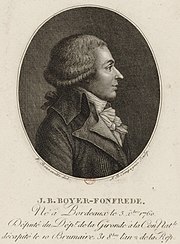Jean-Baptiste Boyer-Fonfrède
Jean-Baptiste Boyer-Fonfrède (* 1766 in Bordeaux , † October 31, 1793 in Paris ) was a leading Girondist politician of the French Revolution .
The scion of one of the large trading families in his town was also trained as a merchant and spent a few months in the Netherlands. His family owned sugar cane plantations on Santo Domingo and ships and was close to the Journu merchant family, whose most famous contemporary members were Bernard Journu-Auber and Antoine-Auguste Journu d'Artiguevieille , Baron de Saint-Magne (1753-1794).
Boyer-Fonfrède appeared as a speaker in his hometown at the beginning of the revolution and, in contrast to his background, made a name for himself as an opponent of slavery . In 1790 he was accepted into the Masonic lodge L'Amitíé . As a member of the National Convention , he voted for the execution of Louis XVI. , but spoke against the September massacres , the Revolutionary Tribunal and against Jean-Paul Marat .
On May 21, 1793 he was elected to the ephemeral Commission of Twelve and voted against the arrest warrant for the left-wing revolutionary Hebert , for which Marat then paid him respect.
Ultimately, at the request of André Amar , he was extradited to the Revolutionary Court and executed.
literature
- A. Kuscinski: Dictionnaire des Conventionnels
- Hervé Ferrière: Jean-Baptiste Geneviève Marcellin Bory de Saint-Vincent (1778-1846), Essai biographique , Thèse Paris-1, 2006.
- Bernd Jeschonnek: Revolution in France 1789–1799. A lexicon. Akademie-Verlag, Berlin 1989, ISBN 3-05-000801-6 .
- Walter Markov , Albert Soboul : 1789. The great French revolution. Urania-Verlag, Leipzig / Jena / Berlin 1989, ISBN 3-332-00261-9 .
Web links
| personal data | |
|---|---|
| SURNAME | Boyer-Fonfrède, Jean-Baptiste |
| BRIEF DESCRIPTION | French Girondi politician |
| DATE OF BIRTH | 1766 |
| PLACE OF BIRTH | Bordeaux |
| DATE OF DEATH | October 31, 1793 |
| Place of death | Paris |
